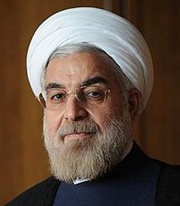Diplomatic breakthrough: Iran agrees to nuclear talks
24 Sep 2013
 Iran's new government took its diplomatic charm offensive to the United Nations on Monday, agreeing to new six-nation talks on its nuclear programme.
Iran's new government took its diplomatic charm offensive to the United Nations on Monday, agreeing to new six-nation talks on its nuclear programme.
Iran's new foreign minister will join nuclear talks with his US counterpart, Secretary of State John Kerry, and top diplomats from five other world powers later this week.
The talks will be the highest level contacts between the US and Iran in six years, in a sign that relations may be thawing.
European Union foreign policy chief Catherine Ashton told reporters of the new round of talks after she met Iranian foreign minister Mohammad Javad Zarif at the United Nations on Monday, a day before the opening of the UN General Assembly. She said the nuclear talks would resume on Thursday on the sidelines of the General Assembly.
"We had a good and constructive discussion," Ashton said of her half-hour meeting with Zarif. "We didn't talk about the details of what we would do. The purpose of this meeting was to establish how we would go forward."
On Twitter, the US-educated Zarif called the meeting with Ashton "positive" and added, "Need new start under new circumstances."
US officials have also said a meeting is possible this week between President Barack Obama and Iran's new centrist president, Hassan Rouhani, who has shown an apparent desire to take a more conciliatory approach towards the West since taking office last month.
If that meeting were to happen, it would be the first between US and Iranian government heads since before the 1979 Islamic revolution that toppled the US-backed Shah, and could help ease tensions in the Middle East that have been worsening given the crisis in Syria.
Thursday's meeting would be the first between a US secretary of state and his Iranian counterpart since May 2007, when US secretary of state Condoleezza Rice met with Iranian foreign minister Manoucher Mottaki in the Egyptian resort of Sharm el-Sheikh.
Ashton said she and Zarif had also agreed to meet with their teams again in Geneva in October. Zarif confirmed there will be another round of nuclear negotiations in October. A report said political directors of the six countries will also attend the October meeting, which he described as a negotiating session.
Iran's president Rouhani is scheduled to address the General Assembly today in his first appearance on the world stage since he was elected in June.
Rouhani is considered a relative moderate among his country's hard-line clerical leaders and he has raised hopes of a thaw in relations with the US with a series of comments and gestures that appear more conciliatory than his predecessor, Mahmoud Ahmadinejad.
Just hours after Rouhani departed Iran for New York on Monday, his government announced that it had freed 80 prisoners arrested in political crackdowns.
The UN Security Council has imposed four rounds of sanctions against Iran because of concerns it is seeking to develop nuclear weapons and its refusal to suspend uranium enrichment - a process that can be used to make fuel for both energy and nuclear weapons. The US and its Western allies have imposed even more punishing sanctions.
Iran is hoping to get relief at the so-called P5+1 nuclear talks from the punishing Western sanctions that have crippled its economy, particularly by slashing its vital oil exports and severely restricting its international banking transactions.
Ashton, the chief nuclear negotiator for the world powers, said she was struck by the "energy and determination" in Zarif's attitude toward the nuclear talks, which include Germany and the five permanent members of the UN Security Council - the US, Russia, China, Britain and France.


















